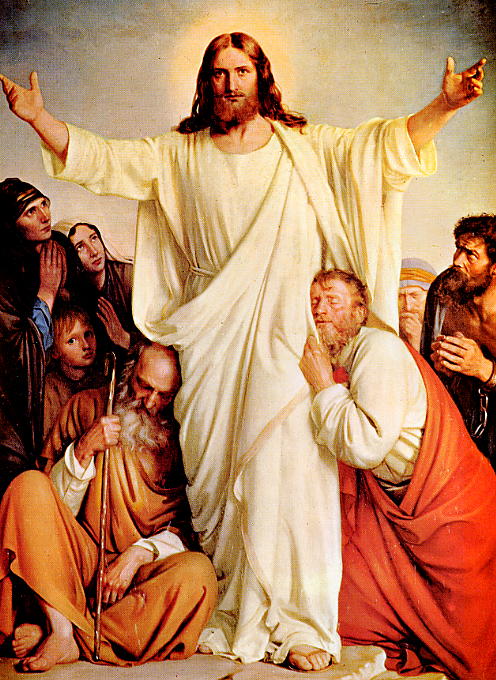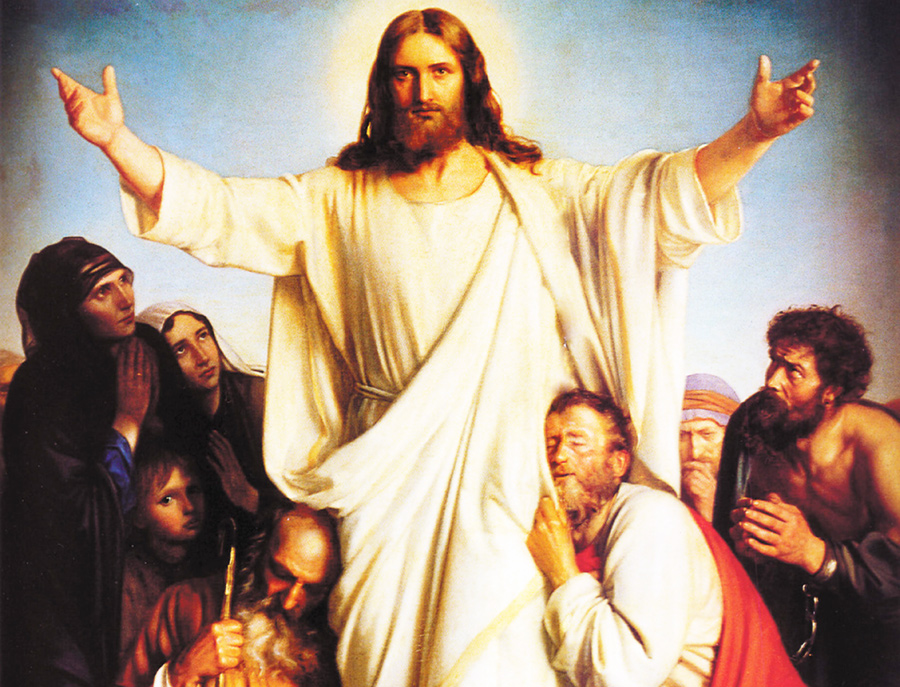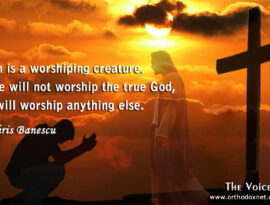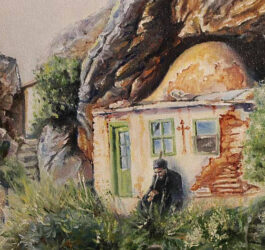 by Chris Banescu –
by Chris Banescu –
There is a reality of the human condition that holds true throughout the history of mankind. Human beings are born with an inner desire for something timeless that nothing in this material world and life experiences can ever truly satisfy. We are all created with a hunger and thirst for God.
All creatures hunger for that for which they were created. A hummingbird hungers for nectar, a lion for meat, a sheep for grass, a dolphin for fish. Man also hungers for food, but he has an even stronger craving for something much greater and more meaningful. “Greater than the hunger for food in man is the hunger for God which manifests itself basically in the hunger for security, for love, peace, joy, meaning, and life,” explains Fr. Anthony Coniaris.
This is why Christ reaffirms that “Man shall not live by bread alone, but by every word that proceeds from the mouth of God” (Matthew 4-4). God is indeed the living water that Jesus spoke of to the Samaritan woman near Jacob’s well, the living water that whoever drinks “will never thirst again”, the water that will become in man “a fountain of water springing up into everlasting life” (John 4-14).
Real Want for Heaven
Man’s inner longing for meaning and happiness is often expressed in a “real want for Heaven” that is present in our souls but which we may not recognize or understand. C.S. Lewis observed that most people, if they looked into their own hearts, would discover a burning desire for something that cannot be found in this world. That many things in this world seem to offer it to us, but they never quite keep that promise. “The longings which arise in us when we first fall in love, or first think of some foreign country, or first take up some subject that excites us, are longings which no marriage, no travel, no learning, can really satisfy.”
Man’s inner longing for meaning and happiness is often expressed in a “real want for Heaven”
Even Bertrand Russell, the famous atheist, wrote of the same yearning. “The center of me is always and eternally a terrible pain – a curious wild pain – a searching for something beyond what the world contains, something transfigured and infinite, the beatific vision – God. I do not find it, I do not think it is to be found, but the love of it is my life … it fills every passion I have. It is the actual spring of life in me” (Bertrand Russell, 1916, Letter to Constance Malleson, The Autobiography of Bertrand Russell).
While this desire for God is present in all of us, many purposely ignore it or deny its existence. Others chose to satisfy that hunger with something else, money, power, possessions, fame, physical beauty, sex, drugs, alcohol, entertainment, thrilling or dangerous activities, secular political ideologies, or various forms of godless mysticism. All of these pursuits satisfy only for a while and ultimately fail to fill the void, oftentimes enslaving or destroying those who foolishly pursue them. The latest headlines and the world history pages are full of examples of famous and not so famous celebrities, artists, politicians, executives, and even religious leaders enslaved or devastated by the worldly passions and possessions they sought after. Without God they are lost and doomed. Most wind up alone, unhappy, insane, or dead in their pursuit of vanity, money, pleasure, power, or counterfeit spirituality.
C.S. Lewis described three possible ways – two wrong and one right – in which men have dealt with this need for God and the failure of anything worldly to fully satisfy it. Lewis called the two misguided approaches “The Fool’s Way” and “The Way of the Disillusioned.” He called the right approach “The Christian Way.”
The fool has said in his heart, ‘There is no God.’
The Fool’s Way
The Fool’s Way represents the way individuals blame the things themselves when the thrill of any activity, relationship, experience, or material possession loses its luster. They go on all their lives believing that if only they had “tried another woman, or went for a more expensive holiday”, bought a bigger house, boat, or plane, acquired more expensive or luxurious things, moved to a nicer part of the country, tried a more dangerous sport, picked a more exciting career, took a stronger drug, or whatever it might be, then, this time, they really would catch that mysterious something they were after.
“Most of the bored, discontented, rich people in the world are of this type. They spend their whole lives trotting from woman to woman (through the divorce courts), from continent to continent, from hobby to hobby, always thinking that the latest is ‘the Real Thing’ at last, and always disappointed,” explained Lewis. We witness this phenomenon most acutely when looking at the lives and excesses of many celebrities and famous and powerful cultural elites, whose debauchery, corruption, spiritual emptiness, and foolishness epitomize this approach.
Another category of fools is exemplified by those who deny God’s existence, reject the teaching of the Scriptures, and belittle, abuse, or attack those who proclaim faith in Him. “The fool has said in his heart, ‘There is no God.’ They are corrupt,” (Psalm 14). Such people not only forsake their own peace and happiness, but often try to spread their misery and darkness by disparaging and persecuting others who believe in God and follow His ways.
The Way of the Disillusioned
The Way of the Disillusioned refers to those who simply give up on finding that special something that could fill their hearts and souls with purpose. These ‘sensible men’, as Lewis calls them, decide that all the idealism, passion, and hope they experienced in their youth or at the height of their personal achievement, was just nonsense, a temporary illusion. They say to themselves and others, “Of course, one feels like that when one’s young. But by the time you get to [be] my age you’ve given up chasing the rainbow’s end,” described Lewis. They lower their expectations and resign themselves to just surviving, not living. Considering themselves practical, they purposely repress in themselves that spark, that inner light, that prompts all human beings to seek and discover the divine.
Tragically, many of the disillusioned gradually become permanent pessimists. As they become more disheartened by the disappointments of this life and their mortality looms ever larger, they no longer find joy in living. They constantly bemoan the “good old days” and fail to see anything positive or worthwhile in their lives or the world around them. They live in a perpetual “doom and gloom” of their own making. But Christ promised, and the saints affirmed, that true happiness and real meaning do exist and await us, beyond our current imperfect existence, in the everlasting life in God’s presence and dominion. “It would be a pity to find out too late (a moment after death) that by our supposed ‘common sense’ we had stifled in ourselves the faculty of enjoying it,” cautioned Lewis.
Creatures are not born with needs for something that doesn’t exist.
The Christian Way
Christianity teaches that all living things were created with desires for things that do exist. A whale needs plankton to satisfy its hunger, a fish needs water to live in, and man feels sexual desire which sexual relations with a woman satisfies. Creatures are not born with needs for something that doesn’t exist. “If I find in myself a desire which no experience in this world can satisfy, the most probable explanation is that I was made for another world. If none of my earthly pleasures satisfy it, that does not prove that the universe is a fraud. Probably earthly pleasures were never meant to satisfy it, but only to arouse it, to suggest the real thing,” reasoned C.S. Lewis.
The Scriptures also point to this explanation. “For now we see in a mirror, dimly, but then face to face. Now I know in part, but then I shall know just as I also am known,” writes St. Paul in his First Epistle to the Corinthians (1 Corinthians 13:12). Our fallen natures, predicated on our voluntary alienation from God and disregard for His love and wisdom, cloud our judgment and obscure the timeless reality that permeates the Universe. We still sense the infinite, but the imperfection of the instruments through which we perceive it, our minds and bodies, distort the truth and make us lose sight of what’s truly important in eternity.
Because of this, we must “take care on the one hand, never to despise, or be unthankful for, these earthly blessings, and on the other, never to mistake them for the something else of which they are only a kind of copy, or echo, or mirage,” wrote Lewis. We must keep alive in ourselves the desire for our true country, God’s eternal kingdom, which we shall reach only after death. We must never let it get snowed under or turned aside; we must “make it the main object of life to press on to that other country and to help others to do the same,” explained Lewis. This is how we can properly understand this life and ultimately discover real meaning and joy.
I have come that they may have life, and that they may have it more abundantly. (John 10:10)
Christianity maintains that man was created to be immortal and live in communion with God and in harmony with all His creation. Despite our rebellion and temporary separation from the Creator, we retain in our minds and souls the imprint of the divine and the desire to find and be with Him. “God designed the human machine to run on Himself. He Himself is the fuel our spirits were designed to burn, or the food our spirits were designed to feed on. There is no other. That is why it is just not good asking God to make us happy in our own way without bothering about religion. God cannot give us a happiness and peace apart from Himself, because it is not there. There is no such thing,” proclaimed C.S. Lewis.
Christ declares: “I have come that they may have life, and that they may have it more abundantly” (John 10:10). In light of this we begin to understand why Our Lord and Savior reveals that “I am the bread of life. He who comes to Me shall never hunger, and he who believes in Me shall never thirst” (John 6:35). He, as timeless and ever-existing God, true Light of true Light, is indeed the only real food and drink that satisfies man. It is only when we recognize and embrace these truths, and, like the Prodigal son, come to our senses, that we begin to live life to the fullest and find our way back to the narrow road that leads us to our true and only home.





Hello,
I stumbled across your site while researching Alexander Solzhenitsyn. I loved what you wrote in your article Man’s hunger and thirst for God. A true blessing to those who read it. I was wondering if I could post this on my site if I give you credit and put a link to your website….the Voice crying in the wilderness. I totally understand if you would rather I not. I’m a homeschool mom and my website is http://www.educatorsathome.com
Many Blessings to you,
Anne